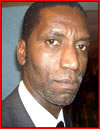Tuesday, August 26, 2008
By Rejoice Ngwenya
 It is human tendency that when the enemy is untouchable, expend one’s anger on the nearest object, even if the object is one’s friend. Such is the dilemma in which Movement for Democratic Change [MDC] break-away formation leader Professor Arthur Mutambara is in. For some reason or other, Zimbabwe’s opposition body politic is defined, or rather seen through a Morgan Tsvangirayi prism of excellence.
It is human tendency that when the enemy is untouchable, expend one’s anger on the nearest object, even if the object is one’s friend. Such is the dilemma in which Movement for Democratic Change [MDC] break-away formation leader Professor Arthur Mutambara is in. For some reason or other, Zimbabwe’s opposition body politic is defined, or rather seen through a Morgan Tsvangirayi prism of excellence.
Political integrity, continuity, courage, consistence and persistence can only receive a popular vote of confidence if it confines itself within the Tsvangirayi school of thought. There are several reasons for this paradox. One is that between 1998 and now, Tsvangirayi has been elevated to a symbol of resistance against Robert Mugabe’s tyrannical rule. Much like in Gene Healey’s "The Cult of the Presidency", once gullible society sets on a dangerous path of hero worshiping, the leader himself begins to feel and act infallible. This is the curse of mankind. It becomes more dangerous when, like with Woodrow Wilson and Robert Mugabe, such authority assumes uncontrolled military adventurism.
The other is Mutambara’s routine frolic into the murky waters of demagoguery. Come to think of it, politics is really more words than action. As a signal tune of differentiating himself from Tsvangirayi’s puppet-of-the-west tag, Mutambara has bent over backwards to show that he is a Pan Africanist who can define his own space without Western leverage. This has been necessary. The African Unity [AU] and Southern African Development Community [SADC] have of late assumed a mettle of credibility when it comes to resolution of the Zimbabwe crisis. Since they have been, for want of a better term, contaminated with Mugabe’s anti-imperialism euphoria, African leaders, especially Thabo Mbeki, have developed a soft spot for Mutambara, much to the chagrin of pro-Tsvangirayi extremists.
Whether it is by coincidence or design, Mutambara’s anti-West demagoguery has now been interpreted as an extension of Mugabe’s symphony. And so, at a time when Zimbabwe is about to deliver a political baby, she has, according to anti-Mugabe critics, come too early for MDC. Electronic tongues are wagging in Zimbabwe’s vibrant global websites, mostly against Mutambara who is seen as a spoiler. The vitriol is directed at the professor’s alignment with the rest of Africa – and Mugabe – that Tsvangirayi is asking for too much power.
Those in Mutambara’s camp are at pains to remind the world that left to his own devices, Tsvangirayi routinely lapses into Wilsonian autocracy, the main reason why MDC split in the first place. They argue that the cult of leadership reigns supreme at Harvest House [MDC headquarters] where Tsvangirayi can never be seen to err, and if this attitude is brought forward to State House, it will mature into fully fledged national dictatorship.
The last reason is based on pure market politics. Everyone wants to be powerful and for Mutambara, the transition from student activism to national leadership has been swift, though, as some internet sites would want to portray, a short circuit, benefiting from what they term ‘self-centered opportunism’. Yes, politics is about opportunism. Had Tsvangirayi not exploited an opportunity to be chairperson of the National Constitutional Assembly Task Force Committee, he would still be wallowing in monotonous trade union politics. Mugabe himself displaced Joshua Nkomo as the leader of preferred choice in Zimbabwe’s guerrilla war. The fact that Mutambara has not been part of the mainstream struggle against Mugabe is as insignificant as the demand by the Joint Operations Command [JOC] that they will not salute Tsvangirayi because he lacks liberation war credentials.
This world is cruel, you snooze, you loose. Tsvangirayi must accept that he is up against intelligent and skimming competition in Mutambara and Mugabe. May the best man, I mean, political baby survive!
